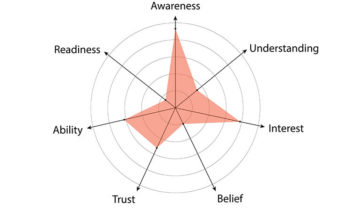Using Peer Forums to Develop Relationships
I am struck by the number of times he uses the word, “value” in conversation. Value, he says, is the key to creating relationships off of which one can scope business, but, and this is counter-intuitive, the trick is to create value before the sale, not after. This makes sense to me. We buy expertise from people we think are smart and whom we trust. Traditional marketing, which relies on telling us why to buy, doesn’t work well in this context. Imagine a strategy consultant putting up a billboard in Manhattan that read, “Tom: Smartest strategist on the planet! Trust me.” Expertise is better demonstrated than described. Likewise, trust is earned, not demanded.
Based on his experience helping some of the biggest expert service providers with their business development, Jacob recommends the peer forum as a way to learn about and connect with potential customers. His tips on how to create a strong interaction:
Identify Those Who You Most Want To Serve
This is easier said than done. There are many sizes of companies and functions who you may be able to serve in your practice, but, says Jacob, pick one because the key to creating a successful forum match group of executives with others who have their same job. As Jacob says, “CFOs don’t want to talk to Controllers.” Neither does the CFO of a $10B revenue company want to talk with a CFO of a $100MM revenue company. So, how do you pick between the executive functions that could be your buyer? Look to executives you have successfully served in the past. If you have done good work for two mid-sized mining companies lifting their finance function up in to the cloud, you have earned a right to talk with other CFO’s of billion-dollar mining companies, if for no other reason than you have good stories to tell. This is what it means to build a practice around a niche.
Gather Them by Phone
Jacob is passionate about the power of a phone-based group interaction. Yes, gathering them for a conference or a dinner is good — who doesn’t bond over a good bottle of Chianti? But if you plan a swell dinner and no one comes, have you really done anything? Jacob sees this all the time. A consulting group decides to host an expensive event. They send out Save-the-Dates but only their customers respond. Suddenly, feeling desperate they put out the call for bodies and their premier CFO conference turns into a mix of people they already know and ones they don’t want to know. The mistake these providers make is to make too big an ask too soon. It’s like that dating service you see in the airplane magazines, It’s Just Lunch. Start with the easy ask — will you join us for a call where fifteen of your peers will be speaking together about best practices? Do that for a while, adding value and earning trust, before you ask them to fly across the country and spend two days with you.
Make It About Them
Jacob is a sales radical. Instead of gathering prospects together and talking about the benefits or working with you, he suggests making the forum about the people you most want to serve. Don’t make it a webinar — “one to many” where you are the expert. Make it a true exchange on what’s working and what’s not. Have faith. It will redound to your reputation. You may be saying to yourself, “I am paying for this platform; shouldn’t I be able to talk about my services?” You can, of course, but it is such a turnoff. People you want to serve have problems and those problems consume them. Your desire to expand your roster of clients is not. Better is to put yourself in their shoes and help them solve their problems. Do that successfully and they will want more. No slides, no long-winded explications of your offerings by industry, function, and geography. Instead, ask lots of questions.
Interview Them First
Jacob calls the pre-interview PIE’s “secret sauce.” He counsels us to do our homework and call participants in an exchange and a series of questions:
- What are your biggest challenges?
- What gates you from what the CEO is asking you to do?
- If you could benchmark what you are doing against what peers are doing, what questions would you ask them?
Only then should you turn to the task of forming an agenda. Asking your customers what they want to talk about is the best guard against the temptation to turn your agenda into a “brochure” for your services. Executives who are likely buyers of your services are smart. They can smell whether the “best practices forum” is about them or about you.
Deepen the Relationship Over Time
When an expert service provider becomes a “trusted advisor,” the relationship with those they are helping tends to bear fruit over a long period of time. This is because productive collaboration is hard to come by. While the expert service relationship has a long sell cycle, the lifetime value of a customer can be very high as can be margins. So be patient. Add value, add value again, built trust, meet up with the executive at a conference, visit them. Always look to deepen and engage. Pull the big brown trout from the Yellowstone River too quickly and you yank out the hook, but fail to reel the fish in, and it will continue to swim free.




